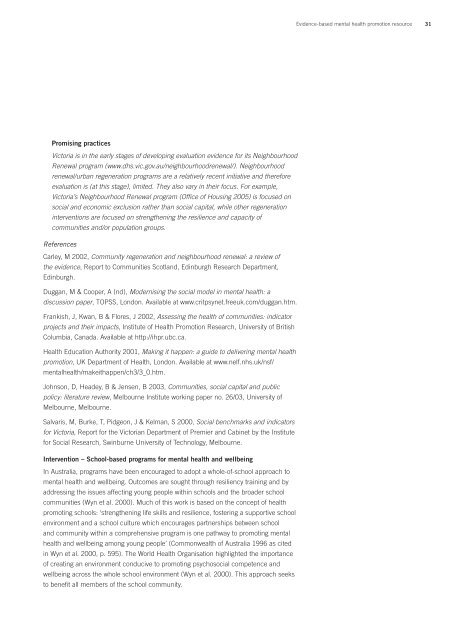Evidence-based mental health promotion resource - health.vic.gov.au
Evidence-based mental health promotion resource - health.vic.gov.au
Evidence-based mental health promotion resource - health.vic.gov.au
You also want an ePaper? Increase the reach of your titles
YUMPU automatically turns print PDFs into web optimized ePapers that Google loves.
<strong>Evidence</strong>-<strong>based</strong> <strong>mental</strong> <strong>health</strong> <strong>promotion</strong> <strong>resource</strong>31Promising practicesVictoria is in the early stages of developing evaluation evidence for its NeighbourhoodRenewal program (www.dhs.<strong>vic</strong>.<strong>gov</strong>.<strong>au</strong>/neighbourhoodrenewal/). Neighbourhoodrenewal/urban regeneration programs are a relatively recent initiative and thereforeevaluation is (at this stage), limited. They also vary in their focus. For example,Victoria’s Neighbourhood Renewal program (Office of Housing 2005) is focused onsocial and economic exclusion rather than social capital, while other regenerationinterventions are focused on strengthening the resilience and capacity ofcommunities and/or population groups.ReferencesCarley, M 2002, Community regeneration and neighbourhood renewal: a review ofthe evidence, Report to Communities Scotland, Edinburgh Research Department,Edinburgh.Duggan, M & Cooper, A (nd), Modernising the social model in <strong>mental</strong> <strong>health</strong>: adiscussion paper, TOPSS, London. Available at www.critpsynet.freeuk.com/duggan.htm.Frankish, J, Kwan, B & Flores, J 2002, Assessing the <strong>health</strong> of communities: indicatorprojects and their impacts, Institute of Health Promotion Research, University of BritishColumbia, Canada. Available at http://ihpr.ubc.ca.Health Education Authority 2001, Making it happen: a guide to delivering <strong>mental</strong> <strong>health</strong><strong>promotion</strong>, UK Department of Health, London. Available at www.nelf.nhs.uk/nsf/<strong>mental</strong><strong>health</strong>/makeithappen/ch3/3_0.htm.Johnson, D, Headey, B & Jensen, B 2003, Communities, social capital and publicpolicy: literature review, Melbourne Institute working paper no. 26/03, University ofMelbourne, Melbourne.Salvaris, M, Burke, T, Pidgeon, J & Kelman, S 2000, Social benchmarks and indicatorsfor Victoria, Report for the Victorian Department of Premier and Cabinet by the Institutefor Social Research, Swinburne University of Technology, Melbourne.Intervention – School-<strong>based</strong> programs for <strong>mental</strong> <strong>health</strong> and wellbeingIn Australia, programs have been encouraged to adopt a whole-of-school approach to<strong>mental</strong> <strong>health</strong> and wellbeing. Outcomes are sought through resiliency training and byaddressing the issues affecting young people within schools and the broader schoolcommunities (Wyn et al. 2000). Much of this work is <strong>based</strong> on the concept of <strong>health</strong>promoting schools: ‘strengthening life skills and resilience, fostering a supportive schoolenvironment and a school culture which encourages partnerships between schooland community within a comprehensive program is one pathway to promoting <strong>mental</strong><strong>health</strong> and wellbeing among young people’ (Commonwealth of Australia 1996 as citedin Wyn et al. 2000, p. 595). The World Health Organisation highlighted the importanceof creating an environment conducive to promoting psychosocial competence andwellbeing across the whole school environment (Wyn et al. 2000). This approach seeksto benefit all members of the school community.



